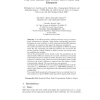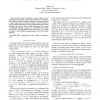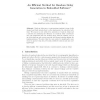211 search results - page 2 / 43 » PSS Is Secure against Random Fault Attacks |
CHES
2006
Springer
13 years 9 months ago
2006
Springer
It is well known that a malicious adversary can try to retrieve secret information by inducing a fault during cryptographic operations. Following the work of Seifert on fault induc...
CHES
2010
Springer
13 years 6 months ago
2010
Springer
Random delays are often inserted in embedded software to protect against side-channel and fault attacks. At CHES 2009 a new method for generation of random delays was described tha...
FDTC
2009
Springer
13 years 11 months ago
2009
Springer
—Fault attacks constitute a major threat toward cryptographic products supporting RSA-based technologies. Most often, the public exponent is unknown, turning resistance to fault ...
GI
2003
Springer
13 years 10 months ago
2003
Springer
: The Byzantine failure model allows arbitrary behavior of a certain fraction of network nodes in a distributed system. It was introduced to model and analyze the effects of very s...
CHES
2009
Springer
14 years 5 months ago
2009
Springer
Random delays are a countermeasure against a range of side channel and fault attacks that is often implemented in embedded software. We propose a new method for generation of rando...



